|
|
|
Sort Order |
|
|
|
Items / Page
|
|
|
|
|
|
|
| Srl | Item |
| 1 |
ID:
091123
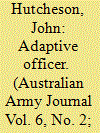

|
|
|
|
|
| Publication |
2009.
|
| Summary/Abstract |
The majority of officers will be working in a multi dimensional and unpredictable operational environment on complex problems that require an integrated inter-agency and/or coalition solution. To assist in developing those solutions officers will need to be more cooperative, compromising and collaborative in order to shape the desired outcome. This desire requires the ability to think critically, communicate effectively, and influence others through persuasive argument. This article seeks to highlight a how Army can develop officers who can think, communicate and influence other non Army people to implement the adaptive Army initiative.
|
|
|
|
|
|
|
|
|
|
|
|
|
|
|
|
| 2 |
ID:
126068
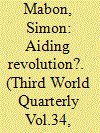

|
|
|
|
|
| Publication |
2013.
|
| Summary/Abstract |
This article explores the role of external actors in facilitating the uprisings in Egypt that have become known as the Arab Spring. It analyses several of the diplomatic cables released by the Wikileaks organisation that possess an Egypt focus. The article suggests that while the cables did not make surprising revelations to Egyptians, the release of this information offered a source of external legitimacy for the protesters by detailing a history of oppression and human rights abuses; conversely, the cables delegitimised the Mubarak regime. The data were then spread via different channels of communication to aid the protest movements both internally and externally. The article concludes by suggesting that while this information was incredibly important, as were the channels of communication used to facilitate events and spread the information, one must be careful not to diminish the importance of agency.
|
|
|
|
|
|
|
|
|
|
|
|
|
|
|
|
| 3 |
ID:
098112
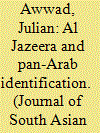

|
|
|
| 4 |
ID:
057440
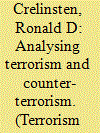

|
|
|
| 5 |
ID:
072985
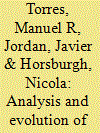

|
|
|
|
|
| Publication |
2006.
|
| Summary/Abstract |
The Global Jihadist Movement (GJM) has a series of well-defined objectives, which constitute the central points of their ideology. In the realization of these goals, propaganda and public communication play a central role. This article studies the evolution of the principal characteristics of GJM propaganda, analyzing over 2,000 documents issued by the GJM between 1996 and 2005.
|
|
|
|
|
|
|
|
|
|
|
|
|
|
|
|
| 6 |
ID:
118386
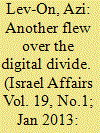

|
|
|
|
|
| Publication |
2013.
|
| Summary/Abstract |
This article is part of a pioneering study which analyses Internet usage by some 600 candidates for heads of 156 local authorities in Israel in the municipal campaigns of 2008. Despite the importance attributed to the municipal elections in the Arab-Palestinian sector in Israel, the high turnout rate, the competitiveness of the elections and the continuing penetration of the Internet, it was scarcely used by candidates, compared to about 50% usage by candidates who competed in municipalities with Jewish populations. Interviews suggest that beyond access gaps, additional obstacles impede the usage of the Internet as an effective political tool in the Arab-Palestinian sector.
|
|
|
|
|
|
|
|
|
|
|
|
|
|
|
|
| 7 |
ID:
084626
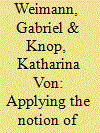

|
|
|
|
|
| Publication |
2008.
|
| Summary/Abstract |
The growing presence of modern terrorism on the Internet is at the nexus of two key trends: the democratization of communications driven by user-generated content on the Internet; and the growing awareness of modern terrorists of the potential of the Internet for their purposes. How best can the terrorists' use and abuse of the Internet be countered? As this article argues, the answer to violent radicalization on the Internet lies not in censorship of the Internet, but in a more sophisticated and complicated strategy, relying on the theoretical notion of "noise" in communication process theory.
|
|
|
|
|
|
|
|
|
|
|
|
|
|
|
|
| 8 |
ID:
066788
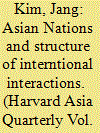

|
|
|
| 9 |
ID:
179944
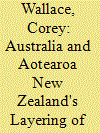

|
|
|
|
|
| Summary/Abstract |
Around 2016, the Australian and Aotearoa New Zealand governments began to disassemble the coherent and optimistic imagery that had hitherto signaled their strategic commitment to accommodating China within an interdependent, prosperous, and strategically stable Asia-Pacific. While Canberra and Wellington remain committed to constructive "bedrock" bilateral relations and still avoid explicitly positioning China as a direct threat in their strategic messaging, both governments have increasingly communicated (1) concerns about their strategic vulnerability and military insecurity that requires enhanced military potency; (2) pessimism that great power competition could disrupt Asia-Pacific stability, requiring strategic diversification and cross-bracing with "Indo-Pacific" partners; and (3) stronger official criticism on narrower, strategically circumscribed issue sets as the two nations attempt to set acceptable terms for anticipated relations of greater future complexity with China. The targets of this "layered" approach to strategic communications are not only Beijing and Washington, DC, but increasingly other important regional partners and domestic stakeholder audiences with diverse interests.
|
|
|
|
|
|
|
|
|
|
|
|
|
|
|
|
| 10 |
ID:
096402
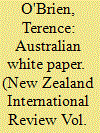

|
|
|
| 11 |
ID:
065772
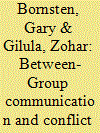

|
|
|
| 12 |
ID:
000510
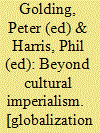

|
|
|
|
|
| Publication |
London, Sage Publication, 1997.
|
| Description |
257p.
|
| Standard Number |
0-7619-5331-0
|
|
|
|
|
|
|
|
|
|
|
|
Copies: C:1/I:0,R:0,Q:0
Circulation
| Accession# | Call# | Current Location | Status | Policy | Location |
| 041882 | 306/GOL 041882 | Main | On Shelf | General | |
|
|
|
|
| 13 |
ID:
081210
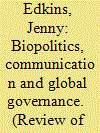

|
|
|
|
|
| Publication |
2008.
|
| Summary/Abstract |
In the aftermath of the 7th July 2005 bombings in London, communication with those searching desperately for relatives and friends was one-way or non-existent. The authorities dealing with the processes of the identification of the bodies of those killed or the treatment of those injured adopted procedures and protocols derived from emergency or disaster planning that were framed in terms of an instrumentalisation or objectification of persons. This article traces how these procedures reflect biopolitical forms of global governance that involve the production of life as 'bare life' and details how inappropriate and brutal these forms of governance seemed both to those searching for the missing and to the London Assembly 7th July Review Committee. It concludes that attention needs to be paid to the proliferation of such forms of politics as administration and the objectification they entail before we reach a stage where all life becomes nothing more than bare life, life with no political voice as such.
|
|
|
|
|
|
|
|
|
|
|
|
|
|
|
|
| 14 |
ID:
096220
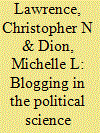

|
|
|
|
|
| Publication |
2010.
|
| Summary/Abstract |
Weblogs (or blogs), as a form of communication on the Internet, have recently risen in prominence but may be poorly understood by both faculty and students. This article explains how blogs differ from other online communication tools and how political science faculty can make use of blogs in their classes. The focus is on using blogs as part of class assignments to reinforce important skills, including critical thinking, political engagement, and essay writing. We also discuss existing academic and professional blogs that may be models for student blogging in political science.
|
|
|
|
|
|
|
|
|
|
|
|
|
|
|
|
| 15 |
ID:
075133
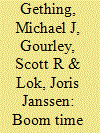

|
|
|
| 16 |
ID:
099391


|
|
|
|
|
| Publication |
Washington, DC, World Bank, 2009.
|
| Description |
xiii, 133p.Pbk
|
| Standard Number |
9780821376218
|
|
|
|
|
|
|
|
|
|
|
|
Copies: C:1/I:0,R:0,Q:0
Circulation
| Accession# | Call# | Current Location | Status | Policy | Location |
| 055304 | 658.45/CAB 055304 | Main | On Shelf | General | |
|
|
|
|
| 17 |
ID:
125224
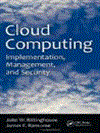

|
|
|
|
|
| Publication |
Boca Raton, CRC Press, 2013.
|
| Description |
xxxviii, 301p.Pbk
|
| Standard Number |
9781439806807
|
|
|
|
|
|
|
|
|
|
|
|
Copies: C:1/I:0,R:0,Q:0
Circulation
| Accession# | Call# | Current Location | Status | Policy | Location |
| 057502 | 004.6/RIT 057502 | Main | On Shelf | General | |
|
|
|
|
| 18 |
ID:
090898
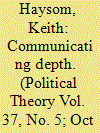

|
|
|
|
|
| Publication |
2009.
|
| Summary/Abstract |
This essay takes as its task the critical comparison of two thinkers who are rarely matched or studied in tandem: Jürgen Habermas and Maurice Merleau-Ponty. It stages a (largely) speculative dialogue between the two thinkers, considering not only the points of convergence but their likely objections to each other's accounts of communication and language. I will argue that Merleau-Ponty, whose own concerns significantly overlap with Habermas's, while simultaneously pulling in a different direction, serves as a useful counter-point to Habermas. This is so because Merleau-Ponty offers us an intersubjectivist account of praxis, from which can be extrapolated an ethics of communicative engagement between self, other, and world. Such a phenomenological and/or existential rereading of the central Habermasian problematic not only compensates for the notorious abstraction of Discourse Ethics, but better underscores possibilities for social transformation inherent in intersubjectivity and the lifeworld than are acknowledged by Habermas.
|
|
|
|
|
|
|
|
|
|
|
|
|
|
|
|
| 19 |
ID:
080714
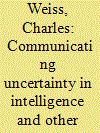

|
|
|
| 20 |
ID:
034075
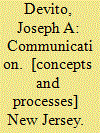

|
|
|
|
|
| Publication |
New Jersey, Prentice-Hill Inc, 1971.
|
| Description |
viii, 232p
|
|
|
|
|
|
|
|
|
|
|
|
Copies: C:1/I:0,R:0,Q:0
Circulation
| Accession# | Call# | Current Location | Status | Policy | Location |
| 007685 | 302.2/DEV 007685 | Main | On Shelf | General | |
|
|
|
|
|
|
|
|
|